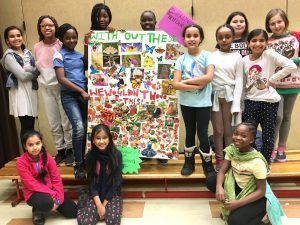Developing a Culture of Change

To view the photo-rich magazine version, click here.
Originally appears in the Spring 2020 issue.
By Taylor Shryne
As environmental issues continue to become more catastrophic and prevalent throughout the planet, more of us are beginning to understand our own impacts and the roles that we as individuals play in the collective deterioration of our earth. More now than ever, it is important for us to understand the power we have to act, and to make a difference. In the City of Calgary, a local settlement agency has been working over the past three years to teach the importance of environmental stewardship to a group of young immigrant girls between the ages of nine and 13. As organizers approach their final year of the four-year project, efforts have been narrowed to focus on one major environmental theme: native pollinator health.
Calgary Immigrant Women’s Association (CIWA) is a non-profit organization which offers a range of settlement services to immigrant and refugee women, girls, and their families. CIWA applies a culturally-sensitive and gender-specific approach to services and aims to address and respond to the diverse needs of the clients they serve. Among the youth services offered at CIWA is an initiative called Project Footprint – Wilderness Club. This four-year project aims to empower its participants through themed activities related to protecting the environment and preserving ecosystems.
CIWA’s Wilderness Club is offered as an afterschool program at two locations: a local elementary school and a low-income community housing space provided by the City of Calgary. A bi-monthly mentorship component is also offered to Wilderness Club participants who would like to build on and further engage in programming through active learning and group-based projects. Facilitators aim to create a safe and inclusive space where girls can build friendships and develop a sense of social inclusion in their new country while learning about very real concepts. Immigrating is not easy for youth; many young newcomers experience isolation as they try to navigate the many language and cultural barriers at such a formative and vulnerable period in their lives. Through working together to create impactful environmental projects, newcomer girls are given the chance to build self-confidence as well as teamwork and leadership skills while fostering a sense of belonging. These moments are essential components of a secure and successful settlement process.
This content is restricted to subscribers only.
If you are not yet a subscriber, please consider taking out a subscription here.
If you are an existing subscriber, kindly log in or contact us at info@greenteacher.com for more information.










